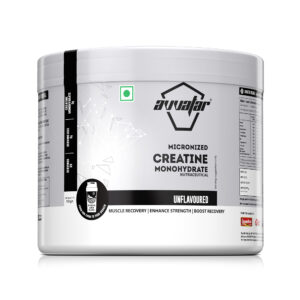Buy Creatine Monohydrate Online in India
Creatine Monohydrate is one of the most popular and effective supplements for building muscle and improving athletic performance. It is a naturally occurring compound found in the human body and also in foods such as meat and fish.
Creatine Monohydrate is a well-researched supplement with numerous benefits, including increased muscle size and strength, improved endurance, and faster recovery.
What are the benefits of using Creatine?
Here are some of the benefits of using creatine:
Increased Muscle Size and Strength: Creatine helps to increase the amount of creatine stored in your muscles, which allows you to perform more repetitions with heavier weights. This leads to increased muscle size and strength.
Improved Endurance: Creatine helps to increase the amount of energy available to your muscles, which can help you to perform longer and harder during your workouts. This can be particularly beneficial for athletes who need to perform at a high level for an extended period of time.
Faster Recovery: Creatine can help to reduce muscle damage and inflammation, which can help you to recover faster between workouts. This means you can train more frequently and make faster progress towards your fitness goals.
Weight Gain: Creatine can help you to gain weight, as it increases the amount of water stored in your muscles. This can be beneficial for athletes who need to gain weight for their sport.
Brain Health: There is some evidence to suggest that creatine can improve cognitive function, particularly in vegetarians and vegans who have lower levels of creatine in their bodies.
Safety: Creatine is one of the most well-researched supplements on the market and is considered safe for most people.
However, as with any supplement, it is important to follow the recommended dosage and speak to a healthcare professional before starting to use it.
Myths about creatine
There are a number of myths about creatine that people often believe are true.
Creatine is a steroid: Creatine is not a steroid, it is a naturally occurring compound found in the body and is also present in foods such as meat and fish.
Creatine causes kidney damage: There is no evidence to suggest that creatine causes kidney damage in healthy individuals. In fact, studies have shown that creatine is safe for most people when used within recommended dosages.
Creatine is only for bodybuilders: While creatine is often used by bodybuilders, it can be beneficial for anyone looking to improve their physical performance, including athletes, fitness enthusiasts, and even older adults.
Creatine causes dehydration: While creatine can increase the amount of water stored in your muscles, it does not cause dehydration when used within recommended dosages. In fact, it can actually help to improve hydration levels by increasing the amount of water stored in the muscles.
Creatine leads to bloating: While some people may experience mild bloating or gastrointestinal discomfort when first starting to use creatine, this typically resolves within a few days. It is not a long-term side effect of creatine use.
Creatine is not safe for women: Creatine is safe for women to use and can be beneficial for those looking to increase muscle size and strength, improve endurance, and recover faster. It is important to follow recommended dosages and speak to a healthcare professional before starting to use it.
Types of Creatine Supplements
There are many different types of creatine supplements available, including creatine powder, flavoured creatine, creatine protein, creatine capsules, and more. Some of the most popular creatine supplements are:
Creatine Monohydrate: This is the most common form of creatine supplement and is considered the best creatine for muscle building. It is also the most researched and safest form of creatine.
Creatine HCL: This is a newer form of creatine that is more water-soluble than creatine monohydrate. It is believed to be more effective than creatine monohydrate, but more research is needed to confirm its benefits.
Buffered Creatine: This type of creatine is buffered with alkaline ingredients, which can help to reduce stomach upset and improve absorption.
Which Creatine Supplement is Best for You?
The best creatine supplement for you depends on your fitness goals and preferences. Some of the most popular creatine supplements include:
MuscleBlaze Creatine Monohydrate: This is a high-quality, pure creatine monohydrate supplement that is free from any additives or fillers. It is an affordable and effective creatine supplement.
GNC Creatine: GNC is a well-known brand in the fitness industry, and its creatine supplement is a popular choice among athletes and bodybuilders.
Asitis Creatine Monohydrate: This is another affordable and effective creatine supplement that is free from any additives or fillers. It is a popular choice among fitness enthusiasts.
How to choose creatine monohydrate?
When selecting a creatine monohydrate supplement, it’s essential to consider several factors to ensure you’re getting a high-quality product that meets your needs. Here’s a concise guide to help you choose the best creatine monohydrate:
- Purity: Look for a creatine monohydrate supplement that is lab-tested for purity and free from contaminants. Choose a product that has undergone third-party testing to verify its quality and safety.
- Form: Creatine monohydrate is available in various forms, including powder, capsules, and tablets. Choose the form that is most convenient for you to consume based on your preferences and lifestyle.
- Dosage: Consider the dosage per serving of the creatine monohydrate supplement. Most products typically provide a standard dosage of 3-5 grams per serving, but some may offer higher or lower dosages. Choose a product that allows you to easily adjust the dosage according to your needs and preferences.
- Price: Compare prices of different creatine monohydrate supplements to ensure you’re getting good value for your money. While cost shouldn’t be the sole determining factor, opt for a product that offers a reasonable price without compromising on quality.
- Brand Reputation: Choose a creatine monohydrate supplement from a reputable and trusted brand with a history of producing high-quality sports nutrition products. Read customer reviews and testimonials to gauge the reputation and reliability of the brand.
- Additives: Check the ingredient list for any unnecessary additives or fillers in the creatine monohydrate supplement. Opt for products that contain minimal additional ingredients to ensure you’re getting pure creatine monohydrate without any unwanted additives.
- Mixability and Taste: If you opt for creatine monohydrate powder, consider the mixability and taste of the product. Choose a powder that mixes easily with water or your preferred beverage without clumping or leaving a gritty texture. Additionally, select a flavour (if available) that appeals to your palate.
By considering these factors, you can confidently choose a high-quality creatine monohydrate supplement that supports your fitness goals and enhances your workout performance.
How to use Creatine?
To effectively use creatine monohydrate for optimal results, follow these simple steps:
- Loading Phase: Start with a loading phase to quickly saturate your muscles with creatine. During this phase, consume around 20 grams of creatine monohydrate per day, divided into 4 equal doses of 5 grams each, for 5-7 days.
- Maintenance Phase: After the loading phase, transition to a maintenance phase where you consume a lower dose of creatine monohydrate to maintain elevated levels in your muscles. Take 3-5 grams of creatine monohydrate per day, ideally after your workout or with a meal.
- Timing: While there is no strict timing requirement for creatine supplementation, many individuals prefer to take it post-workout to capitalise on the heightened muscle uptake of nutrients during this period. However, you can also take creatine at any other convenient time of the day.
- Mixing: Mix the recommended dose of creatine monohydrate powder into water, juice, or your favourite beverage. Stir or shake well until the powder is completely dissolved. Alternatively, you can simply swallow creatine capsules or tablets with water.
- Consistency: Consistency is key when using creatine monohydrate. Take it daily, even on rest days, to maintain optimal creatine levels in your muscles over time.
- Hydration: Ensure you stay well-hydrated while using creatine monohydrate, as it may cause increased water retention within your muscles. Drink plenty of water throughout the day to support hydration and overall health.
- Cycle Off: While not necessary for everyone, some individuals choose to cycle off creatine supplementation periodically to give their body a break. If you decide to cycle off, take a break from creatine for 4-6 weeks before starting another cycle.
By following these guidelines, you can maximise the benefits of creatine monohydrate supplementation and support your fitness goals effectively. Remember to consult with a healthcare professional before starting any new supplement regimen, especially if you have any underlying health conditions or concerns.
Are there any potential side effects?
While creatine monohydrate is generally considered safe for most people when used as directed, some individuals may experience potential side effects. It’s essential to be aware of these possible side effects before starting creatine supplementation:
- Gastrointestinal Distress: Some individuals may experience stomach discomfort, bloating, or diarrhoea when taking creatine monohydrate, especially at higher doses or during the loading phase. To minimise these effects, consider splitting the dose into smaller servings or taking it with meals.
- Water Retention: Creatine supplementation can lead to increased water retention within the muscles, resulting in temporary weight gain and a “bloated” appearance. This effect is typically mild and resolves once creatine supplementation is discontinued or dosage is reduced.
- Muscle Cramps: In rare cases, individuals may experience muscle cramps or dehydration due to increased water retention from creatine supplementation. Ensure adequate hydration by drinking plenty of water throughout the day to prevent muscle cramps and support overall health.
- Liver Enzyme Levels: Some research suggests that creatine supplementation may temporarily elevate liver enzyme levels in certain individuals. While this elevation is usually benign and resolves on its own, it’s essential to monitor liver function if you have underlying liver issues.
- Interaction with Medications: Creatine supplementation may interact with certain medications or supplements, including diuretics and nonsteroidal anti-inflammatory drugs (NSAIDs). If you’re taking any medications, consult with a healthcare professional before starting creatine supplementation to avoid potential interactions.
- Allergic Reactions: Although rare, some individuals may experience allergic reactions to creatine monohydrate, resulting in symptoms such as rash, itching, or difficulty breathing. Discontinue use immediately and seek medical attention if you experience any allergic reactions.
Is creatine safe to use for the kidney & heart?
Creatine monohydrate supplementation is generally considered safe for individuals with healthy kidneys and hearts when used as directed and within recommended dosages.
Numerous studies have shown that creatine supplementation does not pose any significant risk to kidney or heart health in healthy individuals.
Kidney Health: Contrary to common misconceptions, research has demonstrated that creatine supplementation does not adversely affect kidney function in healthy individuals.
Studies have consistently shown that creatine is excreted by the kidneys without causing any long-term damage or impairment, even with prolonged use.
Heart Health: Creatine supplementation has not been found to have adverse effects on heart health in healthy individuals.
While there were initial concerns that creatine supplementation might increase the risk of heart-related issues, subsequent research has refuted these claims.
In fact, some studies suggest that creatine supplementation may have potential benefits for heart health, such as improved exercise capacity and cardiovascular function.
However, it’s essential to note that individuals with pre-existing kidney or heart conditions should exercise caution when considering creatine supplementation.
If you have kidney or heart problems or are taking medications for these conditions, it’s crucial to consult with a healthcare professional before starting creatine supplementation to ensure it is safe for you.
Overall, for healthy individuals, creatine monohydrate supplementation is considered safe and can be an effective way to enhance athletic performance, increase muscle mass, and improve overall fitness.
As with any supplement, it’s essential to use creatine responsibly and follow recommended dosages to minimise the risk of adverse effects.
Best Creatine Monohydrate Brands to consider?
When it comes to choosing the best creatine monohydrate brands, several reputable companies stand out for their commitment to quality, purity, and efficacy.
Here is a list of some of the top brands known for producing high-quality creatine monohydrate supplements:
- Optimum Nutrition: Optimum Nutrition is a renowned brand in the sports nutrition industry, known for its premium quality products. Their creatine monohydrate powder is highly regarded for its purity and effectiveness.
- MuscleTech: MuscleTech is another well-respected brand that offers a range of sports nutrition supplements, including creatine monohydrate. Their creatine products are backed by scientific research and trusted by athletes worldwide.
- MuscleBlaze: MuscleBlaze specialises in providing pure, high-quality supplements at affordable prices. Their creatine monohydrate powder is lab-tested for purity and does not contain any fillers or additives.
When choosing a creatine monohydrate supplement, it’s essential to consider factors such as purity, dosage form, additional ingredients, and brand reputation.
By selecting a product from one of these trusted brands, you can feel confident that you’re getting a high-quality creatine supplement to support your fitness goals.
Overall, the majority of individuals tolerate creatine supplementation well and experience few, if any, side effects.
However, if you have any concerns or experience persistent side effects while using creatine monohydrate, discontinue use and consult with a healthcare professional for further evaluation and guidance.
In summary, creatine can be a beneficial supplement for those looking to increase muscle size and strength, improve endurance, recover faster, gain weight, and potentially improve cognitive function.









































